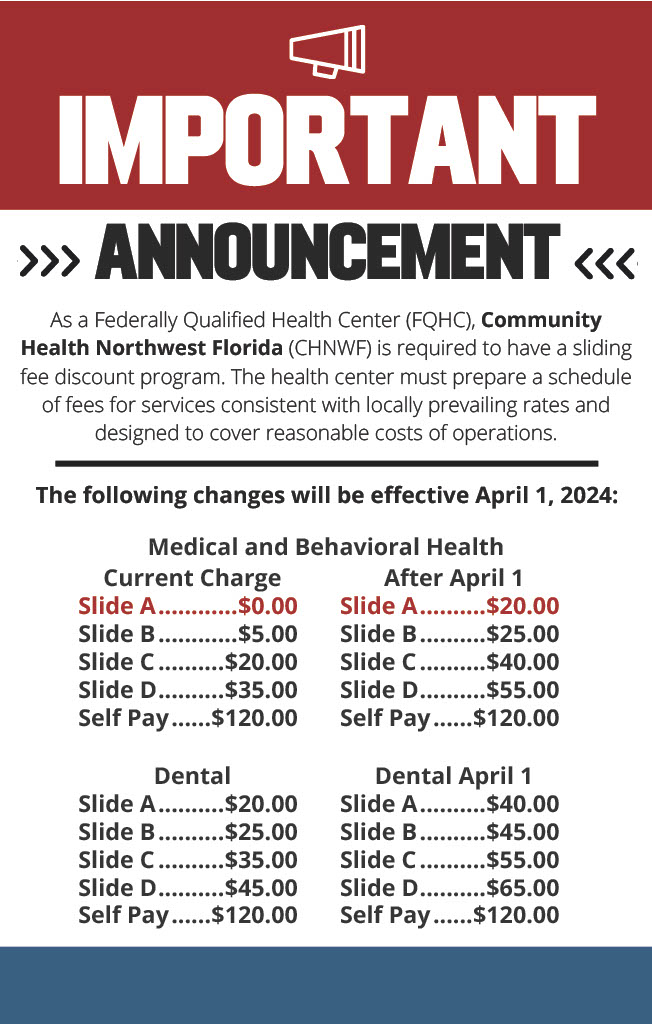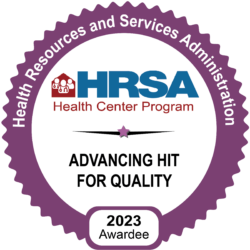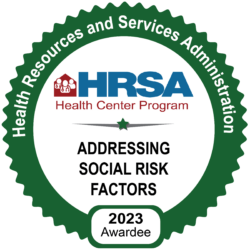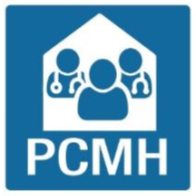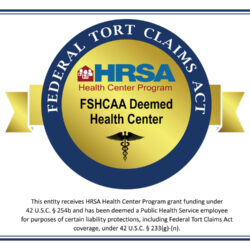Community Health’s Delicate Balance
Community Health’s Delicate Balance
Back to all NewsCommunity Health’s Delicate Balance
By Rick Outzen
Community Health Northwest Florida has had to make difficult decisions as Florida dropped 520,000 people from Medicaid coverage, and another significant funding source has become a political football.
After the State of the Union address on many stations, a Building America’s Future ad ran, bashing a program that has been providing vital funding for federally qualified health centers, like Community Health, and rural and children’s hospitals.
The 30-second spot, “Healthcare for Illegal Immigrants,” ad ties the border crisis to 340B and claims the program is under investigation because it “launders your money and provides free health care for illegal immigrants.”
The ad ended with an appeal: “The more we look, the more we find. We need Republicans to stand up for us.”
WHAT IS 340B?
In 1992, bipartisan congressional action created the 340B Drug Pricing Program to lower drug costs for providers who care for a disproportionate share of low-income patients. The revenue that comes from 340B is an important source of financial support for Community Health and other health centers throughout the country. In the past, 340B provided Community Health $5.5 million annually that the nonprofit puts to offer more services to the underserved in Escambia and Santa Rosa counties.
The money comes from the drug companies. Pharmaceutical manufacturers agree to give discounts on outpatient drugs to qualifying programs as a condition of participating in the large Medicaid and Medicare Plan B markets, like Escambia County.
Medications are sold at discounted prices to 340B providers, like Community Health. Then, when the provider prescribes a drug, it is sold by the pharmacy to the patient’s insurance company at the regular price. That difference between the regular price and the
discounted price is money that can be used to benefit Community Health’s patients.
Unfortunately, Big Pharm, health insurers and pharmacy benefit managers (PBM) are actively working to undermine 340B, according to Community Health leaders. They shared several drug manufacturers have refused to allow 340B drugs to be shipped to the “contract pharmacy” partners that federally qualified health centers rely upon for dispensing 340B drugs to their patients. Also, PBMs are engaging in discriminatory contracting against 340B providers, resulting in lower reimbursement for a 340B health center pharmacy than other pharmacies.
“It’s been about two years now that the major pharmaceutical manufacturers have started pulling out of what we call the contract pharmacy arrangement agreements,” said Dr. Darrell Miller, Community Health’s chief pharmacy officer. “Those agreements allow us to extend the 340B services to not only our in-house pharmacies but also to the outside pharmacies.”
Miller pointed out the glaring misstatement in Building America’s Future ad. “The taxpayer pays nothing for 340B. Who picks up the tab? The drug manufacturing industry because the federal government said, “Listen, if you want to be in part of our Medicare and our Medicaid program, you got to be in this program’. Well, they don’t like it. They don’t like it at all.”
He added, “I hate that those types of ads are out there because they’re just not true—not true at all. And what happens is, unfortunately, our community, our neighbors, our citizens, and our people who live right down the street from us must suffer.”
Who is Building America’s Future? It’s not the nonprofit, bafuture.org, formed by Arnold Schwarzenegger to advocate for increased investment in infrastructure and major transportation.
The Washington Post reported that it’s a nonprofit with ties to people involved in Gov. Ron DeSantis’ presidential campaign and his super PAC, Never Back Down. It played a role in fundraising for the campaign and has funded efforts to discourage Democrats from voting.
NBC News reported the group sent mailers to approximately 75,000 Democratic primary voters in South Carolina, a heavily Black electorate, ahead of its Feb. 3 primary, criticizing President Joe Biden over his administration’s push to ban menthol cigarettes. According to FDA research, Black smokers are more likely to smoke those cigarettes, and the NAACP and the National Action Network have been divided about the ban.
NBC News said sources shared that Building America’s Future was analyzing whether mailers turned voters away from the Democratic primary. The network reported that the group plans to spend more than $1 million on efforts to push Democrats away from voting for Biden in November.
Building America’s Future’s donors are anonymous. The group’s most recently available tax, from 2021, reported it had received $11.3 million in contributions. Its Form 990 states its mission is “To educate the public and build a grassroots movement to advance new policies on a broad range of issues important to the welfare of all Americans, including, but not limited to, housing, healthcare, education, immigrant, energy, economy, jobs, trade and national security.”
Difficult Decisions
The loss of $5.5 million from the 304B program, coupled with the rollback of Medicaid benefits since the end of the COVID-19 public health emergency last spring, has forced Community Health to make cuts.
“Last year, we saw this coming and started doing some things, such as not backfilling, certain positions, and doing more of a surgical cut, but it just continues to compound,” said Community Health CEO Chandra Smiley. “Recently, we’ve had to be a little bit more aggressive and had to lay off about 30 positions and close some sites.”
Community Health will close its adult clinic in Cantonment, its Lakeview pediatric site, optometry services and an administrative site that serves as a central receiving facility. Because the 340B funds helped to underwrite patient care, the health center must change its fee structure.
“The 340B allowed us to operate sites that ran at a loss and keep our nominal fee at a low, low cost,” Smiley said. “Our nominal fee was zero, and we’re now having to increase it to $20, and our scale goes up from there. If you were a $5, now it’s $25. In dental, we’re doing the same thing. Our nominal fee was $20 in dental; now it’s going to be $40 in dental.”
Sliding Fee Changes Effective April 1, 2024
She continued, “It’s still probably the best price in town, if you will, but it does concern me in that we have so many people that live at 150% or below the poverty level that we take care of. They may struggle to make those nominal fees and opt to go to the emergency room, which is what we’ve been trying to avoid.”
Smiley said these decisions have been difficult to make. “With a Medicaid redetermination, we’ve seen about a 17% drop in Medicaid. So we’re seeing our uninsured rates go up and our Medicaid payer mix go down. And I know now more than ever people really need us, and this is a time that we’re having to retract and reduce our footprint, reduce our service lines.”
Even though Community Health has closed some locations, it still is doing outreach.
“Yesterday, we were at Attucks Court with our mobile unit out, and we’re going to use that resource more to make sure that we are reaching out and touching those communities where there’s a high concentration of people that we need to take care of, but it’s a balance,” Smiley said.
“We have a mission to fulfill, and we’re committed to doing that. Unfortunately, we’re just having to pivot and look at how we do our business differently moving forward.”
For more information on Community Health Northwest Florida, visit healthcarewithinreach.org.
